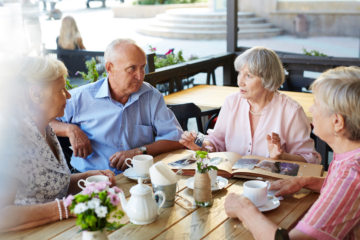What is Sundowning?
Sundowning is a term used to describe a set of dementia-related behaviours that occur at a similar period each day, most commonly around the time of sun-down, and which can last late into the night. The person may appear more agitated, anxious, or fearful, they may become repetitive in their speech and activities, or become aggressive, suspicious, or demanding. They may appear to see, hear, or smell things that aren’t there, but can be very upsetting.
Why does it happen?
Although a great deal is still unknown about Sundowning, one cause may be the disruption to one’s circadian rhythm, particularly in the winter months when we have less access to natural light.
The timing may be significant – such as a memory of feeling exhausted at the end of the day, or perhaps this was when they collected their children from school. It can be helpful to acknowledge this part of the person’s earlier life.
In some cases, the person may be communicating a basic need that hasn’t been met, such as pain, discomfort, toileting, cleanliness, hunger, or thirst, and these should be addressed in the first instance. It can be helpful to keep a diary of potential triggers.
What can you do?
Don’t argue – patience is key; raised voices or denial of the person’s truth can intensify the situation and they are less likely to follow your advice. Where wandering is an issue, if gentle persuasion is not working, then it can help to leave the home and re-enter it.
Routine – Maintaining a predictable daily routine, may afford the person with dementia purpose in, and control of their life. For dementia care packages, head to our dementia care page. Avoid challenging tasks in the evenings, but rather engage them in meaningful activities, such as listening to music, dancing, or looking at old photos. A phone call or recorded message from a loved one can be useful in helping them to feel safe.
Don’t over-do it – too many activities can cause exhaustion, and daytime napping can be detrimental to a good night’s sleep. Sunlight exposure each day can increase good mood and facilitate better sleep.
Where a person is repeatedly checking on switches and locks, it may help to have a checklist that the person could tick off as they go, to reinforce the feeling of completion.
Setting the scene – As daylight fades, switching on lights will help reduce disorientation as well as preventing uncomfortable shadows, which are often mistaken for people. Make the bedroom or living space cozy and welcoming; the aroma of lavender or lemon balm can create a relaxing environment, as would some soothing music. A warm drink with a light snack can eliminate hunger and help the body to slow down.
Sensory issues – poor vision can cause a person to misinterpret what they see triggering anxiety and confusion. There are many items on the market specifically created for people living with dementia, that can help to lessen their anxiety and agitation:
• Hug by Laugh – a teddy with weighted arms and a music player in its tummy to play a favourite song or simulate a beating heart to reduce anxiety.
• Twiddle Muffs or fidget blankets are handmade sensory aids for keeping fidgety fingers occupied.
• Fidget Widget Tools – allow the person to replicate a familiar action such as turning on a tap.
• Full-spectrum lamp – to replicate daylight.
Safety Measures
If you are concerned that the person will wander outside during the night, there are several safety measures available, that do not impact on their sense of independence, such as door sensors, baby monitors, sensor mats, or trackers. A bracelet with a name and a number can help identify the person if they become lost, there are dementia-specific ones on the market, but an engraved bracelet works too.
At PillarCare, we are familiar with the challenges for both the person affected by dementia and those around them. We promote positive risk where possible, working closely with all concerned to ensure independence and quality of life are maximised whilst offering professional support, empathy, and our expertise in specialist dementia care.



